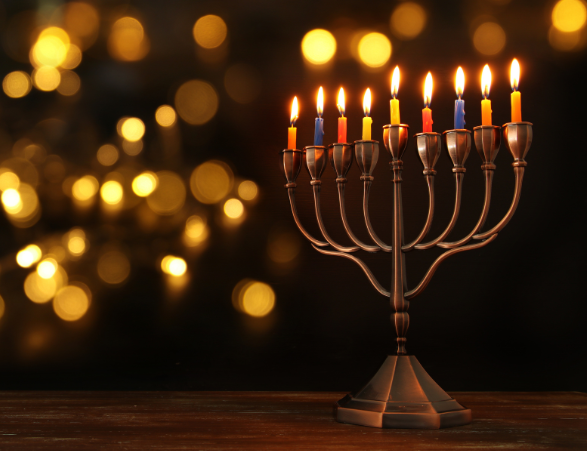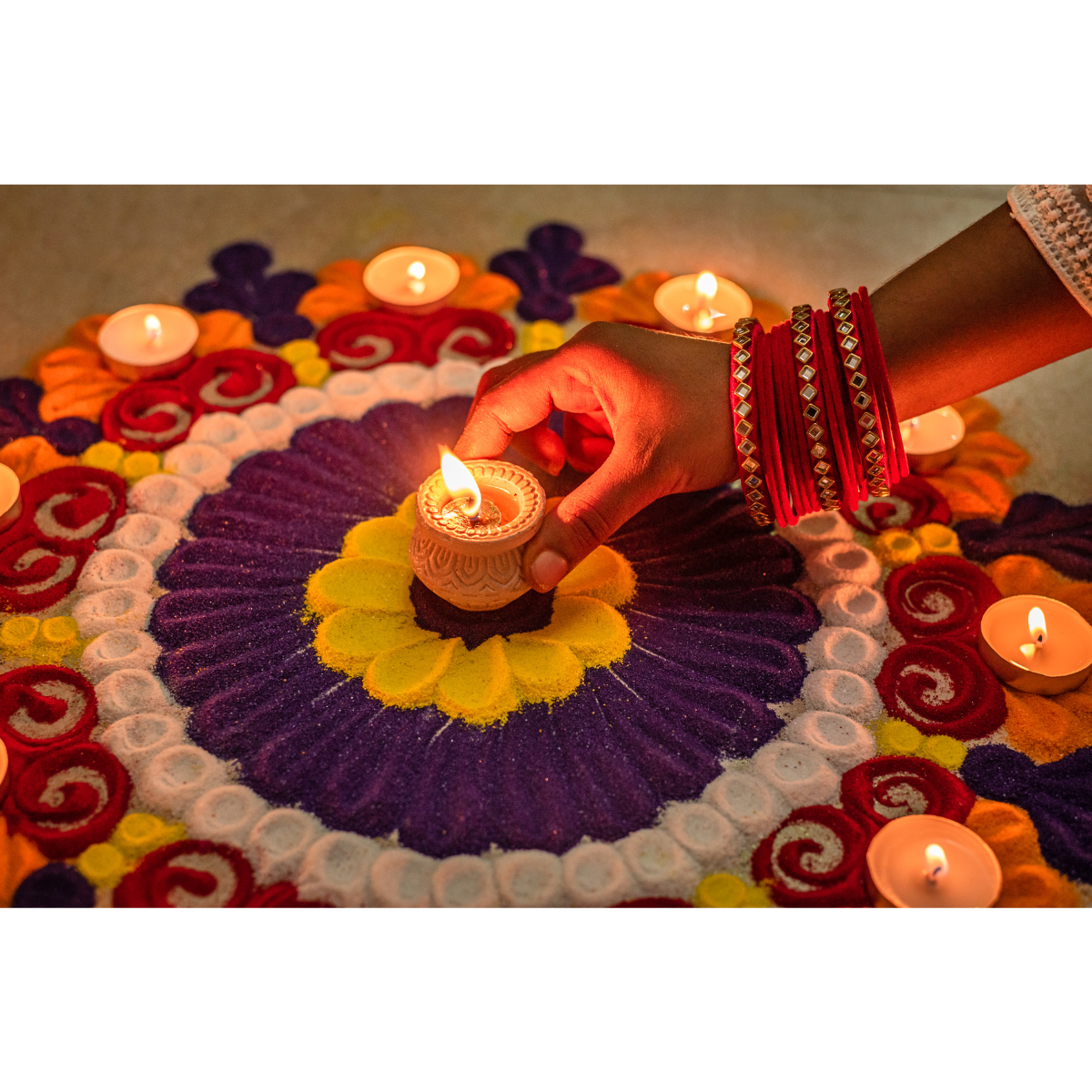.png)
What to Know About Celebrating Halloween in the U.S.
Every year on October 31st, people all over the United States celebrate Halloween. Children and adults dress in ...

Table of Contents
Hanukkah (Hebrew for “dedication”) is often called the Festival of Lights. It is a joyous and significant holiday celebrated by Jewish communities worldwide. Rooted in a historical tale of resilience and faith, Hanukkah holds a special place in the hearts of those who observe it.
Hanukkah begins on the 25th of Kislev, the ninth month of the Hebrew calendar, and usually falls in November or December. The holiday is celebrated with the lighting of the menorah, traditional foods, games, and gifts.
The eight-day Jewish celebration commemorates the rededication during the second century B.C. of the Second Temple in Jerusalem, where according to legend, Jews had risen up against their Greek-Syrian oppressors in the Maccabean Revolt.
The story of Hanukkah dates back over two millennia to when the land of Judea was under the rule of the Seleucid King Antiochus IV. The king sought to Hellenize the Jewish people, suppressing their religious practices and desecrating the Holy Temple in Jerusalem. In a courageous act of rebellion, a group of Jewish warriors known as the Maccabees, led by Judah Maccabee, rose against the oppressive forces.
Miraculously, after their victory, the Maccabees found a small jar of oil, enough to light the menorah in the Holy Temple for just one day. Yet, the flames continued flickering for eight days, leaving them time to find a fresh supply of sacred oil. This miraculous event is at the heart of the Festival of Lights.
Jewish scholars have also suggested that the first Hanukkah may have been a belated celebration of Sukkot, which the Jews had not had the chance to observe during the Maccabean Revolt. One of the Jewish religion’s most important holidays, Sukkot consists of seven days of feasting, prayer, and festivities.
Hanukkah celebrates light triumphing over darkness, freedom over oppression, and faith over adversity. The eight-day festival serves as a reminder of the resilience of the Jewish people and the miracles that can occur in times of despair. The lighting of the nine-branched menorah holds special significance, with each candle representing one of the eight nights of the miraculous oil.
Another candle is added to the menorah after sundown on each of the holiday's eight nights. The ninth candle, called the shamash (“helper”), is used to light the others. Jews typically recite blessings during this ritual and display the menorah prominently in a window as a reminder to others of the miracle that inspired the holiday.
Speak to an Expert About Language or Culture Training
Hanukkah is a time for family, friends, and community. One of the central customs is the nightly lighting of the menorah. Special prayers, songs, and blessings are recited, emphasizing the themes of gratitude and dedication. Traditional Hanukkah foods, such as potato pancakes (latkes), typically garnished with applesauce or sour cream, and jam-filled donuts (sufganiyot), are popular in many Jewish households.
Other Hanukkah customs include playing with four-sided spinning tops called dreidels and exchanging gifts. Children receive presents and gifts of money (Hanukkah gelt), which are sometimes distributed in the form of chocolate coins wrapped in gold foil.
In recent decades, particularly in North America, Hanukkah has become a major commercial holiday, largely because it falls near Christmas. From a religious perspective, however, it remains a relatively minor holiday.
Today, Hanukkah celebrations have evolved to reflect the diverse global Jewish community. Public menorah lighting, community events, and educational programs are organized to share the beauty and significance of the festival with people of all backgrounds. Hanukkah's universal message of hope and perseverance resonates beyond religious boundaries, making it a time for reflection, gratitude, and celebration for people of various faiths.
Our Chief Learning Officer, Jack Marmorstein, reflected on what Hanukkah means to him:
"When you’re a Jewish kid around Christmas time, you can’t help being a little jealous of the magical lights on your neighbors’ houses and of the trees that your friends decorate with their families. During the week of Christmas, my family always took a drive around the neighborhood to look at the lights, and sometimes my friends would tell me about all the ornaments on their trees. Well-meaning people—teachers, neighbors, employees at the grocery store or drivers on the school bus—would wish me Merry Christmas. Sometimes I’d tell them that we were Jewish and celebrate Hanukkah. Other times, I’d just wish them a Merry Christmas back.
These aren’t unpleasant memories. It’s just how it is. We knew America was a majority Christian country and we felt lucky to be here. My father was in the Air Force before I was born, and we flew the Stars and Stripes on national holidays. But these Christmas-time feelings taught me what it’s like to be in the minority, to be different from most of my neighbors and schoolmates.
In many ways, Hanukkah is a holiday that celebrates being true to your identity, even when there’s pressure to be like everyone else. When the Greek-Syrian empire occupied Jerusalem and pressured the Jews to give up their religious practices and join the rest of the empire in their Greek worldview, the Maccabees fought a guerrilla war against the occupiers and drove them out. Hanukkah celebrates their victory.
Today, we don’t emulate the Maccabees' guerrilla warfare, but we want to celebrate our Jewish holidays and observe our traditions in peace. For my family, that meant lighting candles in the menorah, singing traditional prayers and songs, giving gifts, and eating traditional foods. These days, I visit (or Zoom) with my daughters and their babies to share the traditions with them. Today, more people wish us “Happy Holidays,” and my daughters and their non-Jewish husbands have Christmas trees, too. We’re still not quite like the majority in America, though, and that’s still fine with us."
This blog post was written by Megan Tully, Marketing Manager.
.png)
Every year on October 31st, people all over the United States celebrate Halloween. Children and adults dress in ...

Diwali, also known as Deepavali, is India’s biggest and most important holiday of the year. Observed by more than a ...

Who are you calling an old dog?!? I’m 54, but my gray hair means I’m often mistaken for someone much older. I’ve been ...
Please fill out the form below for more information or to schedule a consultation.